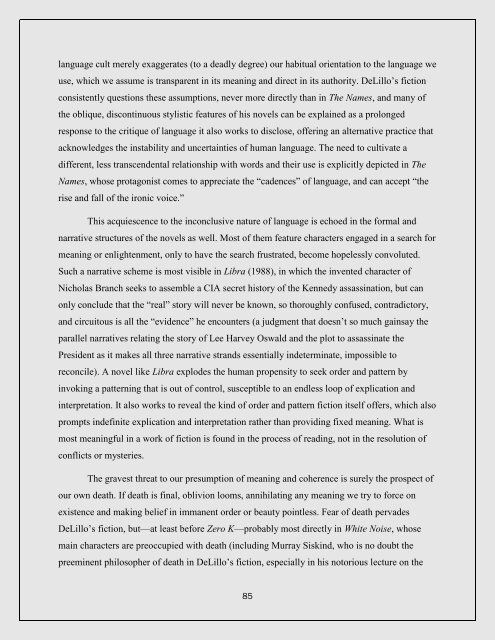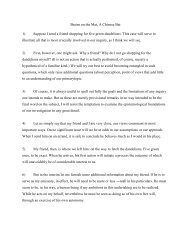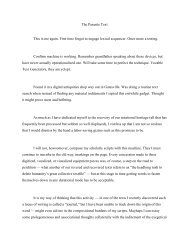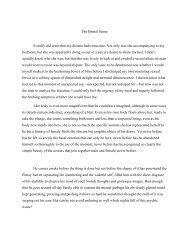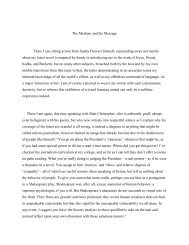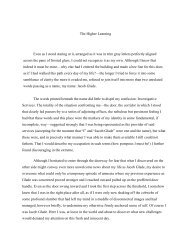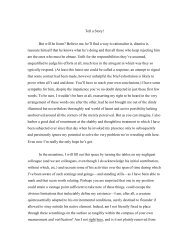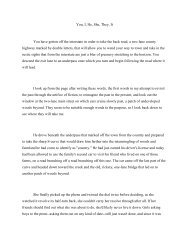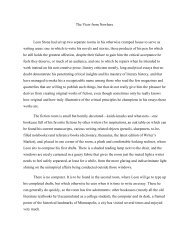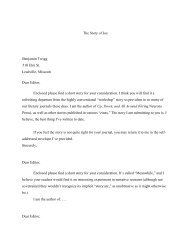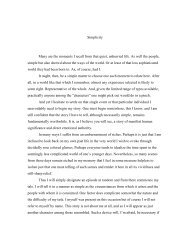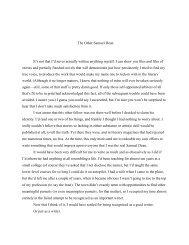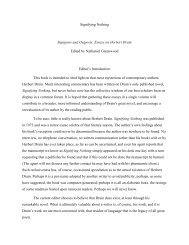APF
Create successful ePaper yourself
Turn your PDF publications into a flip-book with our unique Google optimized e-Paper software.
language cult merely exaggerates (to a deadly degree) our habitual orientation to the language we<br />
use, which we assume is transparent in its meaning and direct in its authority. DeLillo’s fiction<br />
consistently questions these assumptions, never more directly than in The Names, and many of<br />
the oblique, discontinuous stylistic features of his novels can be explained as a prolonged<br />
response to the critique of language it also works to disclose, offering an alternative practice that<br />
acknowledges the instability and uncertainties of human language. The need to cultivate a<br />
different, less transcendental relationship with words and their use is explicitly depicted in The<br />
Names, whose protagonist comes to appreciate the “cadences” of language, and can accept “the<br />
rise and fall of the ironic voice.”<br />
This acquiescence to the inconclusive nature of language is echoed in the formal and<br />
narrative structures of the novels as well. Most of them feature characters engaged in a search for<br />
meaning or enlightenment, only to have the search frustrated, become hopelessly convoluted.<br />
Such a narrative scheme is most visible in Libra (1988), in which the invented character of<br />
Nicholas Branch seeks to assemble a CIA secret history of the Kennedy assassination, but can<br />
only conclude that the “real” story will never be known, so thoroughly confused, contradictory,<br />
and circuitous is all the “evidence” he encounters (a judgment that doesn’t so much gainsay the<br />
parallel narratives relating the story of Lee Harvey Oswald and the plot to assassinate the<br />
President as it makes all three narrative strands essentially indeterminate, impossible to<br />
reconcile). A novel like Libra explodes the human propensity to seek order and pattern by<br />
invoking a patterning that is out of control, susceptible to an endless loop of explication and<br />
interpretation. It also works to reveal the kind of order and pattern fiction itself offers, which also<br />
prompts indefinite explication and interpretation rather than providing fixed meaning. What is<br />
most meaningful in a work of fiction is found in the process of reading, not in the resolution of<br />
conflicts or mysteries.<br />
The gravest threat to our presumption of meaning and coherence is surely the prospect of<br />
our own death. If death is final, oblivion looms, annihilating any meaning we try to force on<br />
existence and making belief in immanent order or beauty pointless. Fear of death pervades<br />
DeLillo’s fiction, but—at least before Zero K—probably most directly in White Noise, whose<br />
main characters are preoccupied with death (including Murray Siskind, who is no doubt the<br />
preeminent philosopher of death in DeLillo’s fiction, especially in his notorious lecture on the<br />
85


